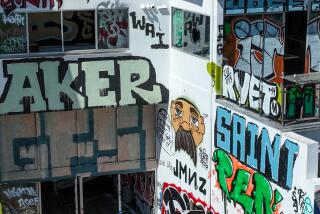A Teflon Metropolis Where No Nicknames Stick
Steve Harvey noted the other day in his droll column (“Only in L.A.,” Metro, Page 2) that Los Angeles does not have a universally accepted nickname, like the Big Apple and the Windy City, and lamented that “It’s a shame that several colorful local nicknames seem to have faded into history.”
He’s right. No nickname seems to stick to Los Angeles, and I doubt that any other metropolis has had as many. Perhaps it’s the city’s very diversity that makes it impervious to nicknames.
Some years ago I called a book of mine about Southern California places “The Big Orange.” (I’m not trying to promote it; it’s out of print.) But that name more accurately characterized the Southern California of my boyhood, when great tracts of the San Gabriel Valley were still in orange trees, and the entire coastal plain often emanated the scent of orange blossoms.
Henry L. Mencken, after his first visit to the West Coast in 1926, took note of this phenomenon, writing in the Baltimore Sun that “the whole place stank of orange blossoms.” Mr. Mencken also essayed one of the city’s first nicknames: Moronia.
Since so many of his fellow intellectuals were at that time coming to Los Angeles to get rich writing for the movies, that name failed to catch on--not that those resident writers didn’t do their best to trash the source of their wealth.
Later, in his play “California Suite,” Neil Simon recognized the city’s oversweet odor. A New Yorker who has just settled into the Beverly Hills Hotel phones home and tells a friend, “The whole place smells like an overripe cantaloupe.”
However, the Big Orange has never caught on, partly, perhaps, because it is readily identified with Orange County, which is not a part and does not want to be thought of as a part of Greater Los Angeles.
Though it is by no means definitive, the name Smogville does not go away; it is a favorite of San Francisco’s popular columnist Herb Caen, though Herb has certainly invented numerous more derogatory ones.
Perhaps one reason Smogville does not thrive is that Angelenos themselves do not accept it. Despite our complaints about life in the fast lane (which seems to get slower and slower) we don’t especially like to deride our city.
Historically, of course, there has been no dearth of unflattering epithets. One of the oldest is Double Dubuque, an invention of the Hollywood press agent Rufus Blair. Of the same vintage, certainly, is Forty Suburbs in Search of a City, which is dated by the number of suburbs said to be in search of a city. There are more than 80 now.
Among other names that have had a momentary vogue are the Nowhere City (which reflects the feeling newcomers sometimes have of not being anywhere); the Capital of Kitsch; Lotus Land (evidently from Tennyson’s “The Lotus Eaters”--”In the afternoon they came unto a land/In which it seemed always afternoon”; The Fake Tomato Factory; Cuckooland (its originator, Will Rogers, actually had Beverly Hills in mind); and evidently of more recent vintage, La La Land, which conjures up a picture of mindless weightlifters and suntanned beach girls.
None of those has seemed to be embraced by Angelenos themselves, nor has any been universally adopted by out-of-towners who might be happy to stick Los Angeles with a nickname that mirrored their low opinions of it.
Angeltown is often seen in print, especially in newspaper columns. I believe it’s one of Caen’s favorites. But it is self-conscious and a bit precious. I have never heard anyone use it casually at dinner or in a bar.
Dodgertown is common, but mostly among baseball fans, and mostly, again, in newspaper columns. People in general don’t refer to Los Angeles as Dodgertown.
Probably the main reason no nickname catches on is that the initials L.A. are so handy and so definitive. You don’t hear anyone referring to St. Louis as S.L . or to San Francisco as S . F . or San Diego as S . D . or New York as N . Y . But L.A. makes music. It is easy to say, it is evocative, and it is wide enough in scope to stand for everything this city is.
But just as the scent of orange blossoms is gone and the Big Orange no longer seems suitable, the 1990s may suggest less amiable names:
How about Gridlock, Gangland, and Crack City?
More to Read
Sign up for Essential California
The most important California stories and recommendations in your inbox every morning.
You may occasionally receive promotional content from the Los Angeles Times.











